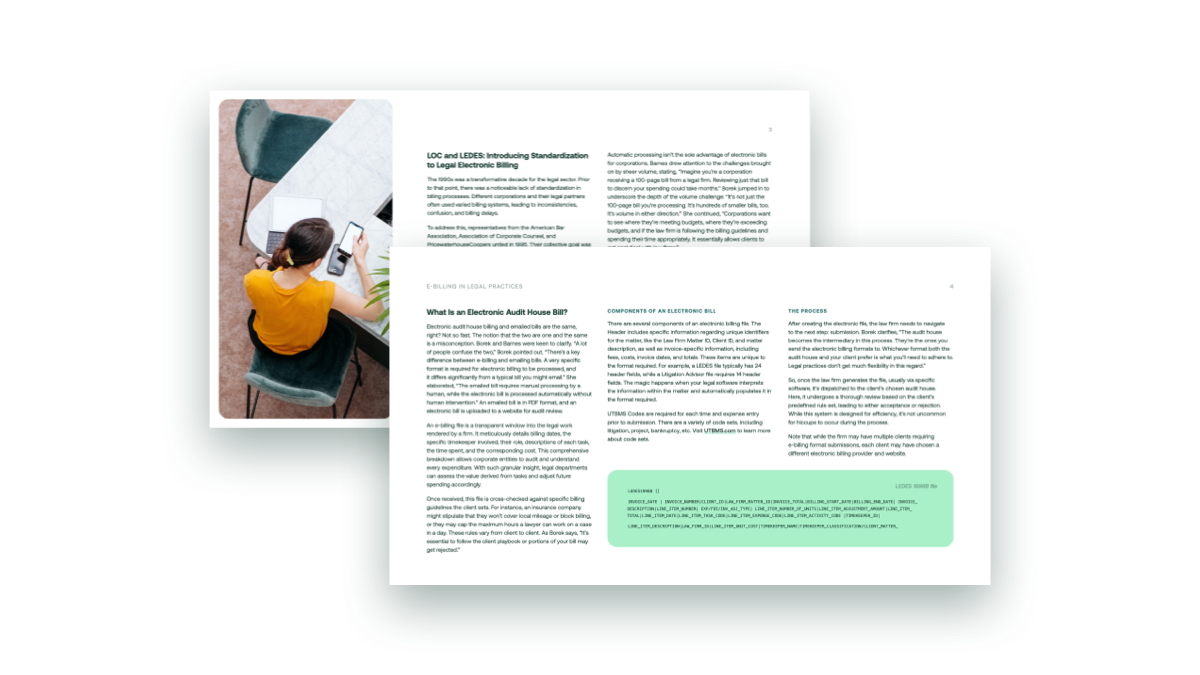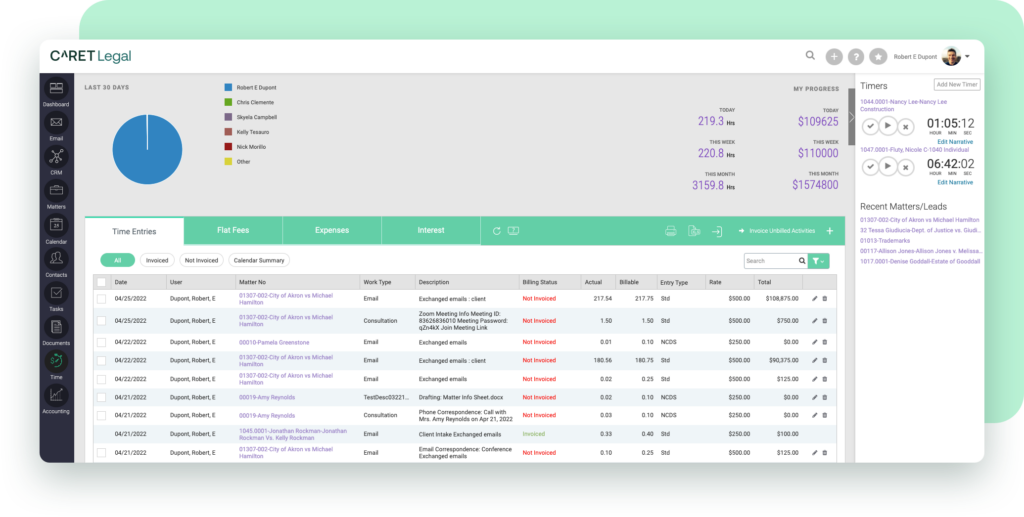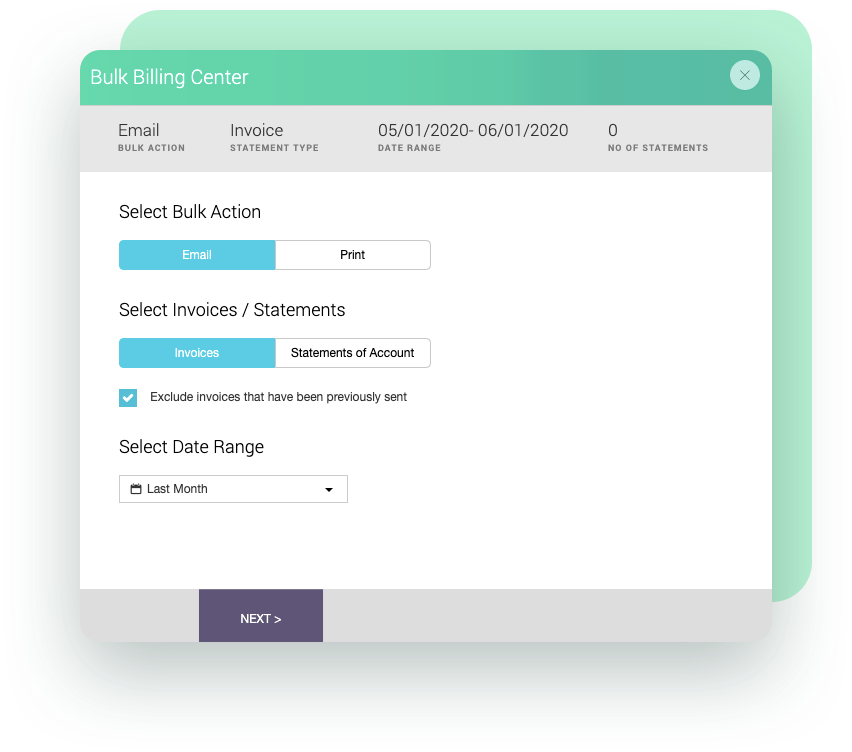Accurate law firm billing not only ensures attorneys are fairly compensated for their work, but it also plays a key role in maintaining a healthy attorney-client relationship.
Accurate billing not only ensures attorneys are fairly compensated for their work, but it also plays a critical role in maintaining a healthy attorney-client relationship. We’ve put together this legal billing cheat sheet to help guide you on how to best bill time at your firm.
How to Bill Time Appropriately at Your Firm
Attorneys can employ different billing styles such as hourly, flat fee, or contingency, depending on the case and client preferences. In essence, correct and versatile billing is key to a productive attorney-client relationship. Let’s take a look at the following legal billing descriptions to learn how to bill your clients appropriately.
When Hourly Billing Makes Sense
In hourly billing, law firms charge clients based on time spent on a case. This method is common where the duration of a case is uncertain, ensuring that the firm’s effort is fully compensated and the client is not overcharged for swift resolutions.
Hourly billing is often employed given the unpredictable nature of matters like:
- Family Law
- Probate Law
- Civil Litigation
- Business Law
For those engaging in time-based billing, accurate time tracking is indispensable. Neglected billable hours result in profit loss, unclaimed work, and weekly reconciliation frustrations.
Automatic time-tracking systems alleviate these issues by contemporaneously tracking all time spent on a case, eliminating the need for manual record-keeping.
Decoding the World of E-Billing
Download our whitepaper Decoding the World of E-Billing for a detailed explanation on when to use LOC and LEDES billing, and more.

When to Implement Fixed Rate Billing
Fixed rate or flat fee agreements are prevalent in transactional areas of law like:
- Real Estate
- Estate Planning
- Bankruptcy
These areas often follow predictable procedures, enabling attorneys to estimate the effort required and bill accordingly. Having accurate data is crucial for setting appropriate fees. Without knowledge of the time spent on different tasks, firms risk setting rates based on intuition or competitors’ charges, rather than what’s profitable and fair.
Automatic time tracking can help collect necessary data for setting appropriate rates. By accurately tracking time spent on various tasks and using that information to calculate fixed fees, attorneys can confidently set their charges.
When to Use Contingency Billing
Contingency billing, where law firms receive a case settlement percentage, can yield high earnings but also risks nonpayment for unsuccessful cases. Common in areas of practice such as:
- Personal Injury
- Workers’ Compensation
- Employment Law
Contingency billing appeals to clients wary of investing in uncertain cases, but mandates careful case selection by law firms. For contingency-based billers, historical reporting is essential for informed decision-making on potential cases. Reporting tools allow profitability analysis by matter type and fee earner, using real-time legal software data. Regardless of the billing method, optimizing the billing process can enhance revenue without overcharging, crucial for a successful, reputable law practice.

Easily convert tasks and activities to time entries with CARET Legal
The Importance of Legal Billing Guidelines
No doubt you’ve heard the old phrase, “Harmony is achieved when everyone is singing from the same song sheet.” The same is true of billing – when everyone knows the rules, there are fewer questions and challenges during an engagement. Accurate and transparent billing guidelines foster trust, showcase professionalism, and help avert fee disputes, while ensuring clients perceive the value of the services rendered.
What to include in your legal billing guidelines
At a minimum, your guidelines should cover:
Definitions of billable time vs. nonbillable time and activities.
Specify what constitutes a billable hour, such as only time spent directly working on a client matter. Define common billable activities like legal research, drafting documents, client meetings, travel time and other tasks directly related to the client’s matter.
Scope of services, deliverables, rates and fee structures.
Clearly outline the specific services, deliverables and work products covered under the engagement. Establish the agreed-upon hourly rates and any alternative fee structures for attorneys, paralegals, legal assistants and other staff. Explain any rate tiers based on seniority, expertise or matter type.
Expense and disbursement policies.
Provide details on how expenses like photocopying charges, phone charges, legal research database fees, travel expenses, meals and other disbursements will be billed. Explain your policies around when expenses are passed through at cost versus when they are marked up.
Invoicing frequency, payment terms, late fees.
Specify how often invoices will be sent (such as monthly, bimonthly, etc.), and clearly define your payment terms and due dates (for example, net 30, net 15). Outline your firm’s late fee assessment rules and process as well as acceptable payment methods.
Standard hourly rates for all attorneys and staff levels.
Provide the specific standard hourly rates for partners, junior partners, associates, paralegals, legal assistants and other staff roles. Explain your firm’s policies around rate increases – such as annual percentage increases or incremental increases by seniority.
Time tracking increments and rounding rules.
Define the minimum increments for time tracking such as 6 minutes or 0.1 hour. Provide clear guidelines for how partial time increments will be rounded – whether always up, always down or to the nearest increment.
Billing dispute resolution process.
Establish a clear internal escalation process for addressing client questions or concerns about invoices. Specify points of contact and steps for resolving disputes, including final steps like mediation or arbitration if needed.
How to present billing guidelines to clients
Don’t just email your legal billing guidelines to clients or briefly mention them. Take time to thoughtfully explain the guidelines in initial onboarding conversations and meetings.
- Walk through the document together, highlighting the sections most relevant to the client’s needs. Draw attention to definitions of billable time and activities, scope of work, rates and invoicing frequency.
- Focus on how your guidelines provide transparency into how billing works and prevent any surprises down the road. Emphasize how they create clarity and mutual understanding about the billing process upfront.
- Make it clear these standards are meant to create a productive working relationship, not strictly favor the firm. Show how they will lead to open communication and help avoid and resolve disputes.
- Invite clients to ask questions and get comfortable with the guidelines. When clients understand the rationale for billing policies, they will be more accepting of them.
Taking time to have collaborative discussions makes the guidelines feel like an agreement, not strict rules. This sets the stage for a positive ongoing client relationship.
Other billing guideline considerations
- Enforce guidelines for consistency
Check invoices against guidelines to ensure compliance. Without monitoring, billing practices often stray from written policies over time. Legal practice management software can embed rules into automated time tracking and invoicing to maintain consistency. - Update billing guidelines regularly
Review legal billing guidelines annually to identify necessary changes based on firm operations, client feedback and industry trends. Adjust time increments, clarify policies, etc. With practice management platforms, guidelines can be updated globally across all client matters in just a few clicks.
If these guidelines sound overwhelming to put together — they don’t have to be. With the right practice management tools, legal billing guidelines are easy to implement, follow, enforce, and optimize.
The Best Way to Bill Time Efficiently at Your Firm
Efficient billing streamlines administrative tasks, ensures timely invoicing for steady cash flow, and reduces potential disputes, leading to a smoother attorney-client relationship. Ultimately, efficient billing benefits both the attorney’s practice and the client’s experience.
Let’s explore some areas where your firm can easily maximize billing efficiency.
Improve Time Tracking Using Software
Automatic timekeeping tools enable easy tracking of billable time during client communication and real-time task recording. Lawyers often bill only for larger tasks, neglecting smaller ones like email responses or phone calls. However, all time spent on a case warrants billing – diligently and accurately. Accurate billing requires precise timekeeping. If a document is worked on, the bill should specify it. If research is conducted, the subject should be indicated. Practice management software with legal billing and standardized invoice capabilities can facilitate this process.
Efficient billing streamlines administrative tasks, ensures timely invoicing for steady cash flow, and reduces potential disputes, leading to a smoother attorney-client relationship.
Monitor Performance
The monitoring of firm performance plays a pivotal role in enhancing efficiency in billing. By keeping a keen eye on how time is being utilized, areas of inefficiency can be identified and subsequently addressed. This not only ensures that all billable hours are accurately accounted for, but it can also spotlight areas where additional training or resources may be required.
The transparency provided by clear, detailed billing fosters a sense of trust between the firm and its clients. Prompt and accurate invoicing also serves to enhance the firm’s reputation for professionalism. By capitalizing on the available tools and maintaining a focus on performance monitoring, you can create a billing process that maximizes your firm’s potential. Resulting in a more productive work environment for your employees and a more satisfactory experience for your clients.
Consistent Invoicing
Prompt payment isn’t luck but results from consistent invoicing, issue-free billing, valued services, and strong client relationships. Automate your billing process to send bills monthly at a consistent time, allowing for attorney or manager invoice review before sending. Specify and detail hourly rates for attorneys, paralegals, law clerks, and other professionals. If full monthly payment is expected, state this clearly upfront. The fee agreement is an opportunity to set client billing expectations, preventing surprises. Your fee agreement should clearly outline payment procedures, requirements, and delinquency handling. Regular invoices for legal services performed and expenses advanced should be expected as long as you provide legal services.

CARET Legal bulk billing simplifies the invoice process
You Don’t Need an Attorney Billing Cheat Sheet with a Legal Practice Management Software
Accurate billing is a linchpin in growing a firm’s profit margins, maintaining client relations, showcasing service value, optimizing resource use, and upholding professional standards. Our legal practice management software has the tools you need to handle all aspects of billing at your firm through a single platform. Plus, we’ve got some great out-of-the-box customizations you can leverage like invoice customization, rules-based invoicing, automated billing workflows, and more.
When you’re ready to ditch the attorney billing cheat sheet and move to a solution that doesn’t require you to have one — we’re ready.
Contact CARET Legal today for a free demo or start a free trial.
